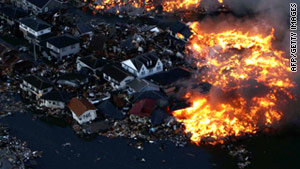The morning after Japan was struck by the most powerful earthquake to hit the island nation in recorded history and the tsunami it unleashed -- and even as the earth continued to twitch with aftershocks -- the disaster's massive impact was only beginning to be revealed.
Rescue efforts began with the first light as military helicopters plucked survivors from roofs and carried them to safety.
The 8.9-magnitude temblor, which was centered near the east coast of Japan, killed hundreds of people, caused the formation of 30-foot walls of water that swept across rice fields, engulfed entire towns, dragged houses onto highways, and tossed cars and boats like toys. Some waves reached six miles (10 kilometers) inland in Miyagi Prefecture on Japan's east coast.
The earth shook with such ferocity," said Andy Clark, who said he had gotten used to earthquakes during his 20 years in Japan but never experienced what he felt Friday at the airport outside Tokyo. "I thought things were coming to an end ... it was simply terrifying."
Buildings shook, heaved and collapsed by the score, and numerous fires ignited.
Hundreds more people were missing, Japanese media reported, citing local and national police. Tens of thousands of people were displaced, according to Japan's Kyodo News Agency.
Prime Minister Naoto Kan said the "enormously powerful" earthquake had caused "tremendous damage over a wide area."
The quake, which struck at 2:46 p.m. (12:46 a.m. ET), prompted the U.S. National Weather Service to issue tsunami warnings for at least 50 countries and territories.
The epicenter of Friday's main quake was located off Miyagi Prefecture, about 230 miles (370 kilometers) northeast of Tokyo, the U.S. Geological Survey said.
Also in Miyagi, officials reported that a train had derailed and authorities had lost contact with four trains in coastal areas, Kyodo reported, citing the East Japan Railway Company.
Six million households, more than 10% of the total in Japan, were without electricity, said Japan's ambassador to the United States, Ichiro Fujisaki.
In Tokyo, rail service was suspended overnight, elevated highways were shut early Saturday and surface streets remained jammed as commuters -- thousands of whom had spent the night in shelters -- tried to get to their homes in outlying areas.
